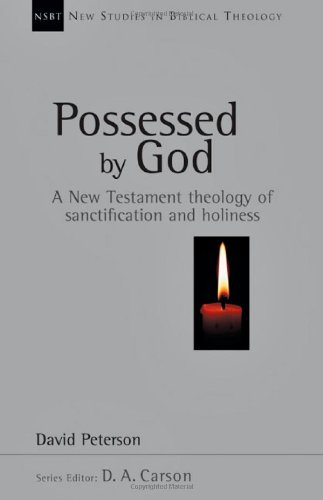Guest Blog by David Peterson
Justification is often simply explained as new status of righteousness given to us through faith in Christ, and sanctification is defined as the subsequent process of pursuing righteousness and becoming more Christ-like. Such an understanding, however, falls short of the breadth and depth of New Testament teaching.
Foundationally, we are justified by Christ’s atoning death for us (Rom. 5:9, ‘justified by his blood’), the benefits of which are received by faith (Rom. 3:28, ‘justified by faith’). Put another way, righteousness is credited to those who believe in the one who delivered over Jesus our Lord to death for our sins and raised him to life for our justification (Rom. 4:23-25).
The apostle Paul outlines the transformative implications of justification when he says that our ‘old self’ was crucified with Christ, ‘so that the body ruled by sin might be done away with, that we may no longer be slaves to sin’ (Rom. 6:6). Indeed, the one who has died with Christ is literally ‘declared free from sin’ (Rom. 6:7), meaning freed from sin’s penalty. Those who count themselves to be ‘dead to sin and alive to God in Christ Jesus’ in this way have the potential to resist sin’s dominion and offer themselves to God for obedience, presenting every part of themselves ‘as weapons for righteousness’ (Rom. 6:11-13). This means becoming ‘slaves to righteousness’, which results in holiness (Rom. 6:18-22). Forensic righteousness or justification is intended to produce in believers a practical righteousness that involves walking ‘in newness of life’ (Rom. 6:4).
Paul draws justification, sanctification, and redemption together when he declares that Christ has become for us ‘wisdom from God – that is, our righteousness, holiness, and redemption’ (1 Cor. 1:30). Using related verbal forms, he links justification and sanctification as follows: ‘you were washed, you were sanctified, you were justified in the name of the Lord Jesus Christ and by the Spirit of our God’ (1 Cor. 6:11). He previously addressed the Corinthians as ‘those sanctified in Christ Jesus and called to be his holy people’ (1:2). The definitive work of God in consecrating a new covenant people to himself was accomplished by Christ in his death (Eph. 5:25-26; Heb. 10:10, 29; 13:12). The benefits are received by calling on the Lord Jesus in faith, which is made possible by the gift of God’s Spirit (1 Cor. 1:2; cf. Acts 26:18; 2 Thess. 2:13-14; 1 Pet. 1:2). The transformative effect of being ‘washed’, ‘sanctified’, and ‘justified’ in the name of Jesus is indicated when Paul outlines the behavior of those who will not inherit the kingdom of God, but then concludes ‘that is what some of you were’ (1 Cor. 6:9-11). Change was experienced when the benefits of the gospel were received by faith and were acted on. The fact of redemption is similarly related to the death of Jesus (Rom. 3:24; 1 Cor. 6:19-20, ‘You are not your own; you were bought at a price’), while the present benefits may be secured when God’s Spirit enables believing obedience (cf. Rom. 8:9-13).
The apostle Paul uses these three terms (justification, sanctification, redemption) in a similar fashion to describe the new relationship with God made possible through the death and resurrection of Jesus. Each term describes a God-given status with profound implications for moral transformation. Positional sanctification provides the impetus and direction for the consecration of every area of our lives to God (1 Thess. 4:1-3; cf. Heb. 12:14). We are to avoid sin and anything that might corrupt the purity of our relationship with the Holy One, because ‘God did not call us to be impure, but to live a holy life’ (1 Thess. 4:4-7; cf. 1 Pet. 1:14-15). Indeed, he has given us his Spirit to make this possible (1 Thess. 4:8). The language of sanctification is covenantal and relational: it has implications for our life together as God’s people: we are called to pursue practical holiness collectively as ‘God’s chosen people, holy and early loved’ (Col. 3:12-14).
There is another strand of the apostle’s teaching that also relates to transformation: God saved us ‘through the washing of rebirth and renewal by the Holy Spirit, whom he poured out on us generously through Jesus Christ our Savior’ (Titus 3:5-6). Regeneration makes belief in the gospel possible, initiating a process of renewal that produces Christ-likeness and culminates in complete glorification (2 Cor. 3:18; cf. Eph. 4:22-24; Col. 3:9-10). Regeneration finds its continuation as we are renewed in the image of our Creator, and sanctification finds its continuation in Spirit-empowered, holy living. These are different ways of describing the same work of God in us, though the terminology has different biblical roots and is used in different ways.
The work of Christ is so comprehensive and extensive that different sets of biblical terms need to be employed to explain it. We should not diminish our understanding of the benefits by confusing these terms. We need to discover both the distinctive contribution of each set and the way in which they overlap in meaning and significance.
David Peterson is Senior Research Fellow and Lecturer in New Testament at Moore Theological College (Australia). Among his books are the following:
Possessed By God: A New Testament Theology of Sanctification and Holiness
Transformed By God: New Covenant Life and Ministry
Engaging with God: A Biblical Theology of Worship
